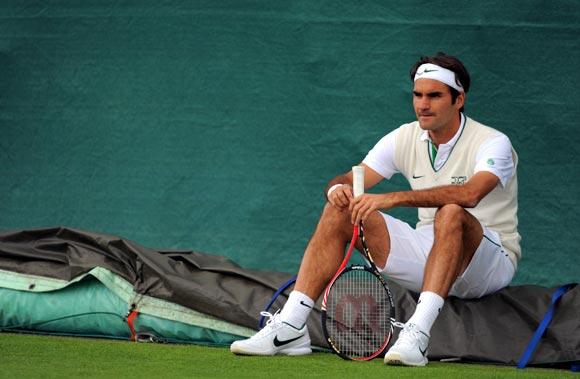
Roger Federer has not won a Grand Slam title for almost 30 months and is no longer the world's top-ranked player, yet when it comes to pulling power he remains the number one attraction at Wimbledon.
The moment the casually-dressed 16-times Grand Slam champion sauntered on to the players' terrace on Saturday he looked like the pied piper of Wimbledon.
His every move was shadowed by dozens of young and old autograph hunters and a host of media representatives.
Even high-profile former players jostled for space in the scrum surrounding Federer, who in two weeks' time could draw level with Pete Sampras and William Renshaw's record of seven men's titles at the All England Club.
Also present on Saturday was the current King of Wimbledon, Novak Djokovic, and Britain's heir apparent, Andy Murray, but they were barely given a second glance by the throng who simply wanted to rub shoulders with a player who has long been dubbed "the ultimate tennis god".
When a young boy adoringly looked up to Federer and said 'I want to be as god, sorry, as good as you,' the amused Swiss ruffled the fan's hair and asked 'How good are you now?'.
Once he had satisfied the masses, Federer escaped to an underground bunker at the All England Club to talk about playing in the golden era of tennis, his chances of winning his first singles gold medal when Wimbledon hosts the Olympics tennis event next month and about being bestowed honours outside his sport.
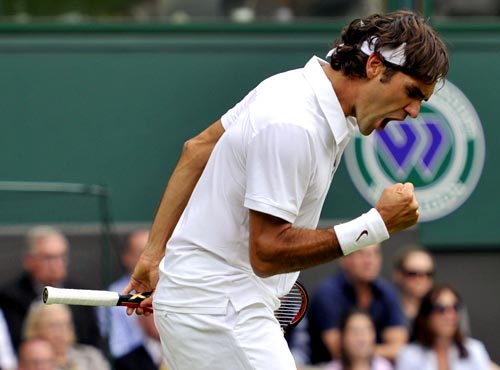
A lot of players feel privileged but unlucky that their careers have coincided with this current generation at the top. Do you feel lucky or unlucky to have played in this era?
Do I feel lucky? I feel lucky that I've had such a wonderful career because I never thought it would be that incredible. But then again would I have had more success than let's say if a (Lleyton) Hewitt, if a Rafa (Nadal), if a Novak (Djokovic), if a (Marat) Safin would not have been around? I don't know.
I believe then someone else would have been around who would have beaten me as many times. I think the other guys see it the same. If I wouldn't have been around then there would have been another great player like me around. So you just go with it and draw inspiration from those that make you work harder and you try to become the best you can be.
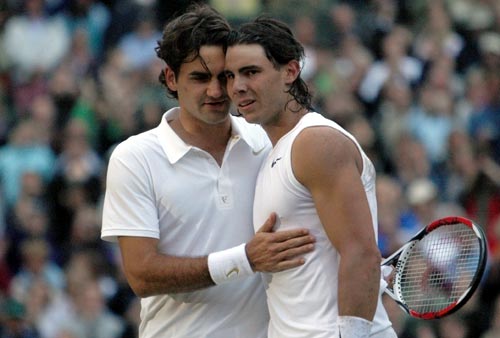
Had Rafa's career not coincided with yours, you probably would have won another four or five French Open titles and your total tally might have been around 23 or more - have you wondered about that?
Honestly I haven't thought about it too much. I've enjoyed my rivalry with him. Some losses have been tough against him but it makes the victories a bit sweeter as well (especially) when you do beat someone who you have lost many times against. Like for me in the beginning (David) Nalbandian and (Tim) Henman and (Andre) Agassi and Hewitt and so forth.
If you are able to turn around a win-loss record or if you are able to come out of a tough place and adjust your game and end up beating that person, that's also important for the mind and the player you are.

This is a once-in-a-lifetime opportunity to win at Wimbledon twice in a month. Does that reduce or increase the pressure?
It takes it away because you get two shots at it. But obviously the Olympics is only every four years so that creates a lot of pressure. I've been there already three times so I think that's going to help me out.
It's also going to help me out that I've actually won an Olympic gold already in doubles (in 2008). Whereas people think 'you have to win this one and there's a lot of pressure on you'. I see it another way and I'm not just saying this to get pressure off my back. I can handle any pressure really.
I would think it's an advantage to have two (events at Wimbledon) in the space of a month. I think it's a big advantage for the one who can actually win Wimbledon or the one who can play finals as well as semis. That means they already have so many matches on grass, they know exactly how Wimbledon plays, particularly at the back-end of the tournament.
Then going into the beginning of the Olympics will be somewhat similar (but also) ... so different. The best of three set tennis early on in the Olympics is going to push the margins and it's going to make it smaller and more difficult to dominate the field.
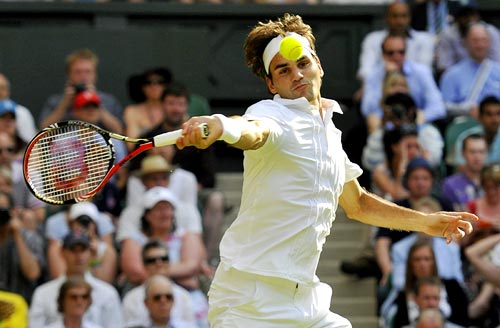
You will have the opportunity over the next month of playing best of five sets at Wimbledon and then best of three sets at the Olympics. Which do you think will be more to your advantage and why?
I always think best of five is an advantage for the top players because a spell of two or five bad minutes or a double fault or stupid shot or a bad miss could cost you the match in a best of three set match on grass.
What are your plans for the two to three weeks between Wimbledon and the Olympics?
I'll take a week's vacation, work hard for a week and then prepare for a week. I will be leaving London for a couple of weeks.
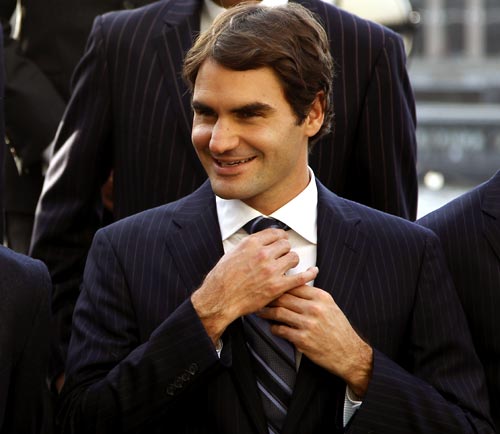
You have had a lot of honours bestowed on you, such as having your image on postage stamps, having a street named after you and being the second most respected person in the world behind Nelson Mandela. Which honour has meant the most?
(Laughing and shaking his head) They all came as a big surprise to me and they all are presented differently. One you get an email, one you get a phone call and one they want to have a meeting with you. I'm extremely grateful for how I am seen in Switzerland because that's where I am from. When I can be a great ambassador for my country, I feel proud.
That whole list of being the second most respected person in the world was like ... I don't even want to say it was too good to be true because that's not true. I was like 'what is this list all about? Is this true or is this not true?'
It was very nice that people actually do believe that I'm genuine, that I'm easy to listen to, they trust what I say, all these things obviously make me very happy. I do try to bring across a good story and a good image for our game so it's nice to get recognition for that. I don't need it but it's obviously nice when you do get it.
Which has been the most bizarre honour or one that has made you laugh?
Ha ha, I guess (being on) all those sexy lists or whatever. GQ magazine - most sexy man of the year. I don't know if I was once but I have been the GQ man of the year. I was like 'yeah right, this is only because I'm playing well, I'm successful and I'm famous'. That's the only reason.
If you don't take it that way, people are going to remind you that's it's only because of that. Because you don't want to have a balloon head and start flying off.
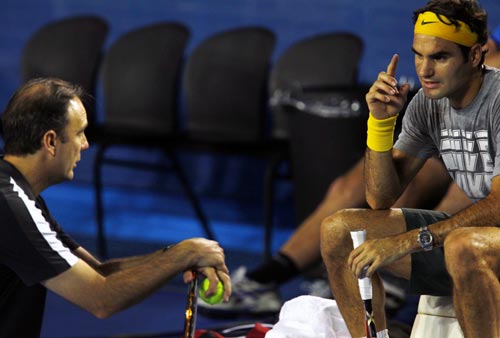
There have been long periods in your career where you were successful despite not having a coach. What does your coach Paul Annacone bring to the table that a 16-times grand slam champion doesn't already know?
It's a good question and that's why it's important for me to pick the right people around me right now. I probably do know very much that other people can never know just because I've been out on Centre Court serving for a match for history. I have a lot of experience about those things but ... Severin Luthi, who is the (Swiss) Davis Cup captain, and Paul, they work very closely together and analyse every player and analyse my own game.
The coaching staff is something I've been able to go without, I've been able to go with just one coach and I've been able to go with two coaches as it is right now. I've always tried to keep it interesting for myself.
It's important for me that they do criticise me, they do give me advice, they do challenge me. I don't pay a coach just so he's there and says, 'You're doing great and you're the best of all time'. I don't need to hear that on a daily basis.

Do you plan to play on when your twin girls are of a school age? If yes do you know how the travelling plans will work for the family as you have always credited your wife Mirka's presence as being a large part of your success?
Not yet. Obviously I'd still like to play for many years and I hope that problem will arise. I'm still going to be playing for the next four years and they are just going to turn three next month. So it's exciting times right now on tour with them, it's very active. It's very busy and I'm very thankful to my wife who makes it all work.
People sometimes underestimate how difficult it actually is to manage the whole situation but we'll see where and how they're going to go to school. We've got to figure it all out. We have ideas and have spoken about it a little bit but we are still far off so don't quite know how it's all going to work out.
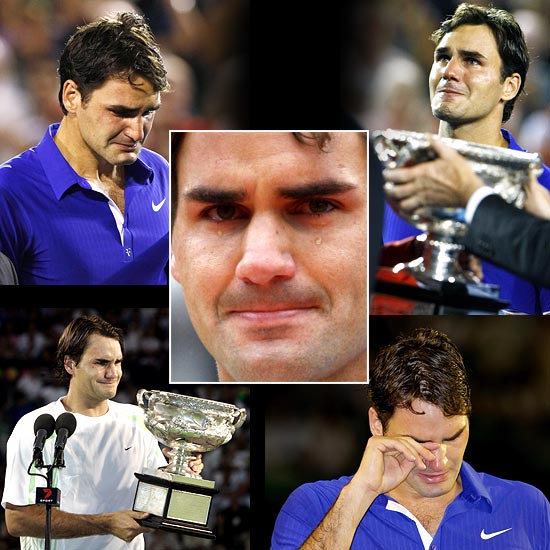
Apart from your trophies, your career can also be played out with a montage of you crying: like crying after beating Pete Sampras at Wimbledon in 2001, crying after winning your first Wimbledon or crying after the 2009 Australian Open final defeat to Nadal. How do you feel about that when you look back?
I'm happy that I did show those emotions. I used to only show emotions when I lost as a kid. Obviously as a junior, you're not going to win a match and cry, you're always going to cry more when you did lose because you're sad, you're upset, you're disappointed. I was always a very emotional person in that regard.
Then all of a sudden it hit me when I beat Sampras at Wimbledon in 2001 and then when I won the Davis Cup in Switzerland against the Americans in my hometown of Basel. I was like 'what is happening to me? Why am I having so many emotions when I'm winning?' So I guess for me it was normal when I did win Wimbledon and hold the trophy in my hands (I cried). I'm happy I had these moments.
Some I obviously I wish I didn't cry after losses, like in Australia (after the epic five-set final defeat by Nadal). But I was just so exhausted. When I sat down (at the end) I was actually calm about it but when I got on the podium and saw all the fans so respectful and had to speak, it (the tears) all of a sudden came out.
But I don't regret any of my outbursts. Some people think it's strange, some people think it's fantastic. I'm happy it all happened to me so that I could savour it and also feel the pain because it's not always that easy out there. It shows that I do care about the sport very dearly.
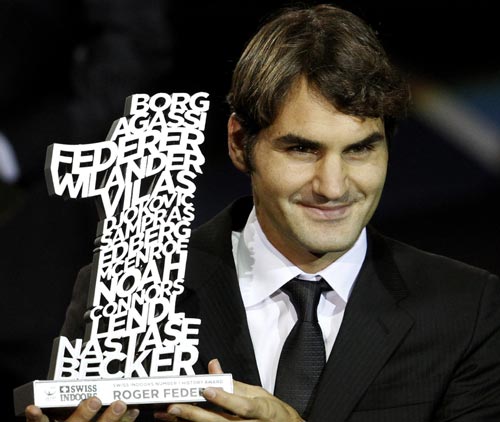
You own a ton of tennis records. But what do you view as the greatest sporting achievement?
What I do appreciate a lot is longevity at the highest of levels. Because when I was winning my first Wimbledon and becoming number one for the first time in 2004, I was lucky enough to look up to other athletes that were doing the same thing I was doing but already for multiple years. Such as Tiger Woods, Michael Schumacher, Valentino Rossi.
So that was inspiring for me to look at other athletes who did something exceptional. I thought, 'oh my god, I don't know how they do it' and the next thing you know you are there as well. So I'm very proud that I've been able to be very consistent at the highest of levels for a very long time because I didn't use to be famous for being consistent at all.
For a long time people thought that was my big weakness as people thought if you hang in there with Federer, you'll beat him eventually because he will let go. Today I'm famous for it and I think that's thanks to all these great champions out there who inspired me.